An Analysis of Entrepreneurial Ventures and Business Management
VerifiedAdded on 2020/10/22
|17
|5500
|84
Report
AI Summary
This report delves into the realm of entrepreneurship, examining various types of ventures, including small businesses, scalable startups, large companies, and social enterprises. It explores the relationships between these ventures and different typologies of entrepreneurship, highlighting their similarities and differences in terms of definition, function, characteristics, and objectives. The report further investigates the impact of micro and small businesses on the economy, emphasizing their importance for social and economic growth. It also identifies key characteristics, traits, and skills that distinguish successful entrepreneurs from traditional business managers, analyzing how entrepreneurial personalities reflect their motivations and mindsets. Finally, the report assesses how background and experience can either hinder or foster entrepreneurial endeavors, providing a comprehensive overview of the entrepreneurial landscape. The report is contributed by a student and is available on Desklib, a platform providing AI-based study tools for students.

Entrepreneurship and
Small Business
Management
Small Business
Management
Paraphrase This Document
Need a fresh take? Get an instant paraphrase of this document with our AI Paraphraser
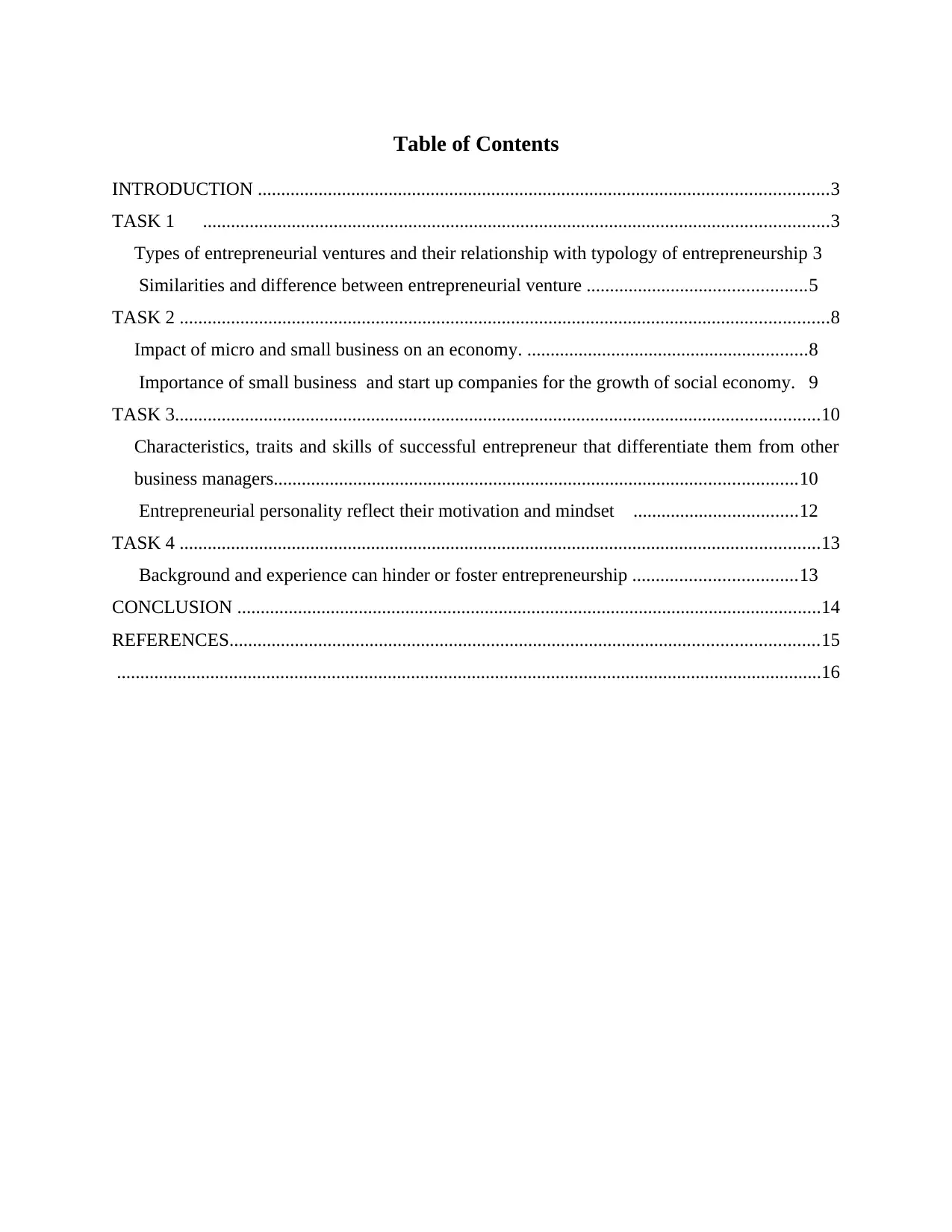
Table of Contents
INTRODUCTION ..........................................................................................................................3
TASK 1 ......................................................................................................................................3
Types of entrepreneurial ventures and their relationship with typology of entrepreneurship 3
Similarities and difference between entrepreneurial venture ...............................................5
TASK 2 ...........................................................................................................................................8
Impact of micro and small business on an economy. ............................................................8
Importance of small business and start up companies for the growth of social economy. 9
TASK 3..........................................................................................................................................10
Characteristics, traits and skills of successful entrepreneur that differentiate them from other
business managers................................................................................................................10
Entrepreneurial personality reflect their motivation and mindset ...................................12
TASK 4 .........................................................................................................................................13
Background and experience can hinder or foster entrepreneurship ...................................13
CONCLUSION .............................................................................................................................14
REFERENCES..............................................................................................................................15
.......................................................................................................................................................16
INTRODUCTION ..........................................................................................................................3
TASK 1 ......................................................................................................................................3
Types of entrepreneurial ventures and their relationship with typology of entrepreneurship 3
Similarities and difference between entrepreneurial venture ...............................................5
TASK 2 ...........................................................................................................................................8
Impact of micro and small business on an economy. ............................................................8
Importance of small business and start up companies for the growth of social economy. 9
TASK 3..........................................................................................................................................10
Characteristics, traits and skills of successful entrepreneur that differentiate them from other
business managers................................................................................................................10
Entrepreneurial personality reflect their motivation and mindset ...................................12
TASK 4 .........................................................................................................................................13
Background and experience can hinder or foster entrepreneurship ...................................13
CONCLUSION .............................................................................................................................14
REFERENCES..............................................................................................................................15
.......................................................................................................................................................16
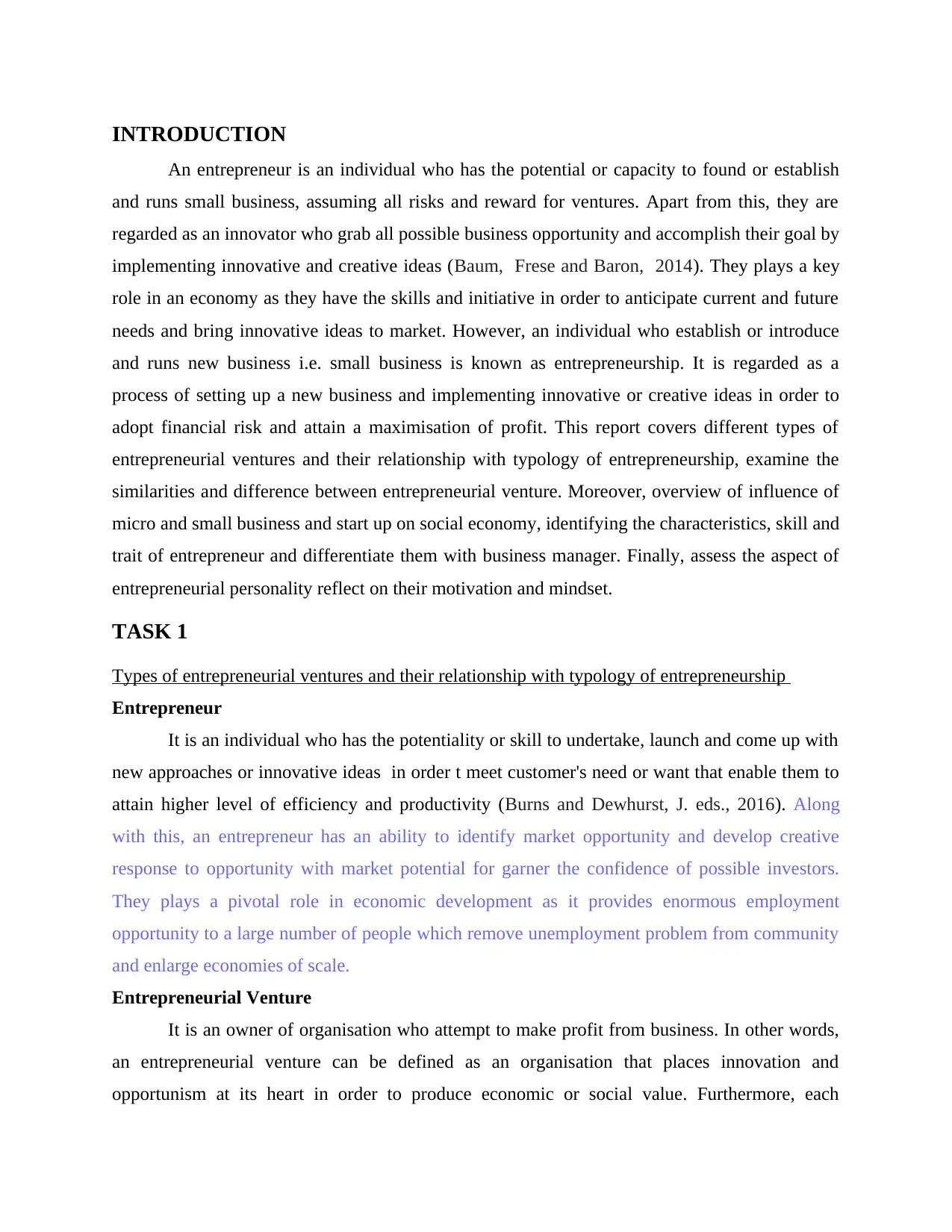
INTRODUCTION
An entrepreneur is an individual who has the potential or capacity to found or establish
and runs small business, assuming all risks and reward for ventures. Apart from this, they are
regarded as an innovator who grab all possible business opportunity and accomplish their goal by
implementing innovative and creative ideas (Baum, Frese and Baron, 2014). They plays a key
role in an economy as they have the skills and initiative in order to anticipate current and future
needs and bring innovative ideas to market. However, an individual who establish or introduce
and runs new business i.e. small business is known as entrepreneurship. It is regarded as a
process of setting up a new business and implementing innovative or creative ideas in order to
adopt financial risk and attain a maximisation of profit. This report covers different types of
entrepreneurial ventures and their relationship with typology of entrepreneurship, examine the
similarities and difference between entrepreneurial venture. Moreover, overview of influence of
micro and small business and start up on social economy, identifying the characteristics, skill and
trait of entrepreneur and differentiate them with business manager. Finally, assess the aspect of
entrepreneurial personality reflect on their motivation and mindset.
TASK 1
Types of entrepreneurial ventures and their relationship with typology of entrepreneurship
Entrepreneur
It is an individual who has the potentiality or skill to undertake, launch and come up with
new approaches or innovative ideas in order t meet customer's need or want that enable them to
attain higher level of efficiency and productivity (Burns and Dewhurst, J. eds., 2016). Along
with this, an entrepreneur has an ability to identify market opportunity and develop creative
response to opportunity with market potential for garner the confidence of possible investors.
They plays a pivotal role in economic development as it provides enormous employment
opportunity to a large number of people which remove unemployment problem from community
and enlarge economies of scale.
Entrepreneurial Venture
It is an owner of organisation who attempt to make profit from business. In other words,
an entrepreneurial venture can be defined as an organisation that places innovation and
opportunism at its heart in order to produce economic or social value. Furthermore, each
An entrepreneur is an individual who has the potential or capacity to found or establish
and runs small business, assuming all risks and reward for ventures. Apart from this, they are
regarded as an innovator who grab all possible business opportunity and accomplish their goal by
implementing innovative and creative ideas (Baum, Frese and Baron, 2014). They plays a key
role in an economy as they have the skills and initiative in order to anticipate current and future
needs and bring innovative ideas to market. However, an individual who establish or introduce
and runs new business i.e. small business is known as entrepreneurship. It is regarded as a
process of setting up a new business and implementing innovative or creative ideas in order to
adopt financial risk and attain a maximisation of profit. This report covers different types of
entrepreneurial ventures and their relationship with typology of entrepreneurship, examine the
similarities and difference between entrepreneurial venture. Moreover, overview of influence of
micro and small business and start up on social economy, identifying the characteristics, skill and
trait of entrepreneur and differentiate them with business manager. Finally, assess the aspect of
entrepreneurial personality reflect on their motivation and mindset.
TASK 1
Types of entrepreneurial ventures and their relationship with typology of entrepreneurship
Entrepreneur
It is an individual who has the potentiality or skill to undertake, launch and come up with
new approaches or innovative ideas in order t meet customer's need or want that enable them to
attain higher level of efficiency and productivity (Burns and Dewhurst, J. eds., 2016). Along
with this, an entrepreneur has an ability to identify market opportunity and develop creative
response to opportunity with market potential for garner the confidence of possible investors.
They plays a pivotal role in economic development as it provides enormous employment
opportunity to a large number of people which remove unemployment problem from community
and enlarge economies of scale.
Entrepreneurial Venture
It is an owner of organisation who attempt to make profit from business. In other words,
an entrepreneurial venture can be defined as an organisation that places innovation and
opportunism at its heart in order to produce economic or social value. Furthermore, each
⊘ This is a preview!⊘
Do you want full access?
Subscribe today to unlock all pages.

Trusted by 1+ million students worldwide
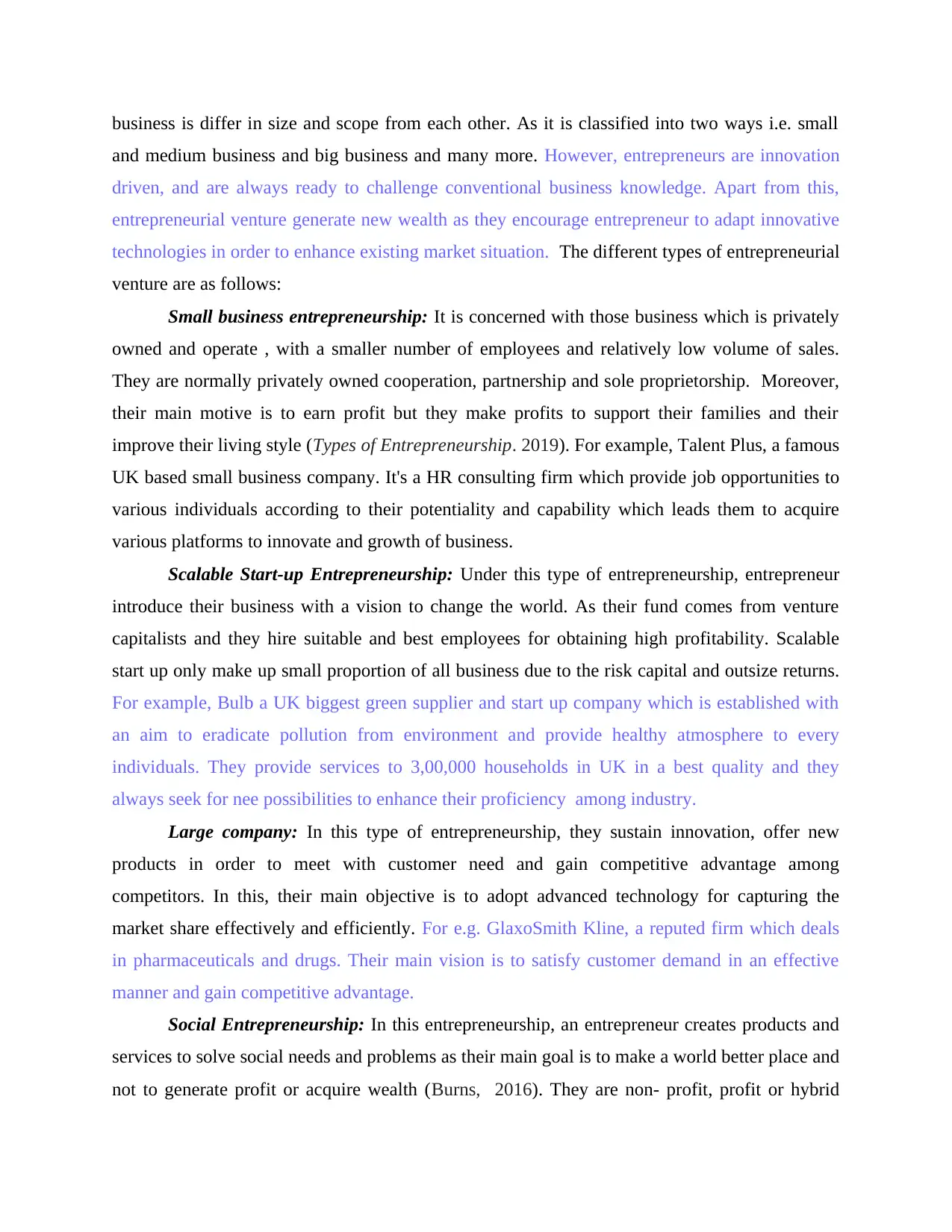
business is differ in size and scope from each other. As it is classified into two ways i.e. small
and medium business and big business and many more. However, entrepreneurs are innovation
driven, and are always ready to challenge conventional business knowledge. Apart from this,
entrepreneurial venture generate new wealth as they encourage entrepreneur to adapt innovative
technologies in order to enhance existing market situation. The different types of entrepreneurial
venture are as follows:
Small business entrepreneurship: It is concerned with those business which is privately
owned and operate , with a smaller number of employees and relatively low volume of sales.
They are normally privately owned cooperation, partnership and sole proprietorship. Moreover,
their main motive is to earn profit but they make profits to support their families and their
improve their living style (Types of Entrepreneurship. 2019). For example, Talent Plus, a famous
UK based small business company. It's a HR consulting firm which provide job opportunities to
various individuals according to their potentiality and capability which leads them to acquire
various platforms to innovate and growth of business.
Scalable Start-up Entrepreneurship: Under this type of entrepreneurship, entrepreneur
introduce their business with a vision to change the world. As their fund comes from venture
capitalists and they hire suitable and best employees for obtaining high profitability. Scalable
start up only make up small proportion of all business due to the risk capital and outsize returns.
For example, Bulb a UK biggest green supplier and start up company which is established with
an aim to eradicate pollution from environment and provide healthy atmosphere to every
individuals. They provide services to 3,00,000 households in UK in a best quality and they
always seek for nee possibilities to enhance their proficiency among industry.
Large company: In this type of entrepreneurship, they sustain innovation, offer new
products in order to meet with customer need and gain competitive advantage among
competitors. In this, their main objective is to adopt advanced technology for capturing the
market share effectively and efficiently. For e.g. GlaxoSmith Kline, a reputed firm which deals
in pharmaceuticals and drugs. Their main vision is to satisfy customer demand in an effective
manner and gain competitive advantage.
Social Entrepreneurship: In this entrepreneurship, an entrepreneur creates products and
services to solve social needs and problems as their main goal is to make a world better place and
not to generate profit or acquire wealth (Burns, 2016). They are non- profit, profit or hybrid
and medium business and big business and many more. However, entrepreneurs are innovation
driven, and are always ready to challenge conventional business knowledge. Apart from this,
entrepreneurial venture generate new wealth as they encourage entrepreneur to adapt innovative
technologies in order to enhance existing market situation. The different types of entrepreneurial
venture are as follows:
Small business entrepreneurship: It is concerned with those business which is privately
owned and operate , with a smaller number of employees and relatively low volume of sales.
They are normally privately owned cooperation, partnership and sole proprietorship. Moreover,
their main motive is to earn profit but they make profits to support their families and their
improve their living style (Types of Entrepreneurship. 2019). For example, Talent Plus, a famous
UK based small business company. It's a HR consulting firm which provide job opportunities to
various individuals according to their potentiality and capability which leads them to acquire
various platforms to innovate and growth of business.
Scalable Start-up Entrepreneurship: Under this type of entrepreneurship, entrepreneur
introduce their business with a vision to change the world. As their fund comes from venture
capitalists and they hire suitable and best employees for obtaining high profitability. Scalable
start up only make up small proportion of all business due to the risk capital and outsize returns.
For example, Bulb a UK biggest green supplier and start up company which is established with
an aim to eradicate pollution from environment and provide healthy atmosphere to every
individuals. They provide services to 3,00,000 households in UK in a best quality and they
always seek for nee possibilities to enhance their proficiency among industry.
Large company: In this type of entrepreneurship, they sustain innovation, offer new
products in order to meet with customer need and gain competitive advantage among
competitors. In this, their main objective is to adopt advanced technology for capturing the
market share effectively and efficiently. For e.g. GlaxoSmith Kline, a reputed firm which deals
in pharmaceuticals and drugs. Their main vision is to satisfy customer demand in an effective
manner and gain competitive advantage.
Social Entrepreneurship: In this entrepreneurship, an entrepreneur creates products and
services to solve social needs and problems as their main goal is to make a world better place and
not to generate profit or acquire wealth (Burns, 2016). They are non- profit, profit or hybrid
Paraphrase This Document
Need a fresh take? Get an instant paraphrase of this document with our AI Paraphraser
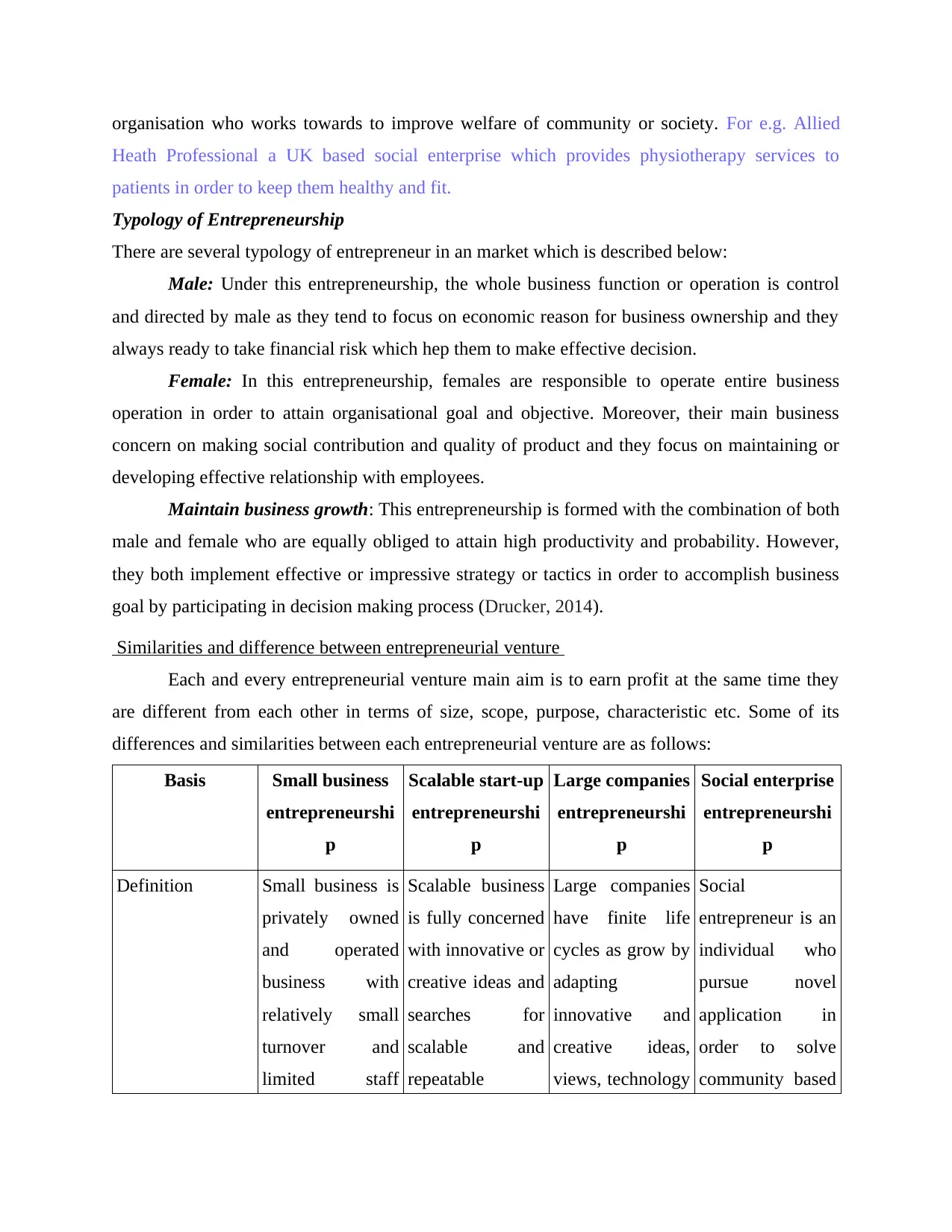
organisation who works towards to improve welfare of community or society. For e.g. Allied
Heath Professional a UK based social enterprise which provides physiotherapy services to
patients in order to keep them healthy and fit.
Typology of Entrepreneurship
There are several typology of entrepreneur in an market which is described below:
Male: Under this entrepreneurship, the whole business function or operation is control
and directed by male as they tend to focus on economic reason for business ownership and they
always ready to take financial risk which hep them to make effective decision.
Female: In this entrepreneurship, females are responsible to operate entire business
operation in order to attain organisational goal and objective. Moreover, their main business
concern on making social contribution and quality of product and they focus on maintaining or
developing effective relationship with employees.
Maintain business growth: This entrepreneurship is formed with the combination of both
male and female who are equally obliged to attain high productivity and probability. However,
they both implement effective or impressive strategy or tactics in order to accomplish business
goal by participating in decision making process (Drucker, 2014).
Similarities and difference between entrepreneurial venture
Each and every entrepreneurial venture main aim is to earn profit at the same time they
are different from each other in terms of size, scope, purpose, characteristic etc. Some of its
differences and similarities between each entrepreneurial venture are as follows:
Basis Small business
entrepreneurshi
p
Scalable start-up
entrepreneurshi
p
Large companies
entrepreneurshi
p
Social enterprise
entrepreneurshi
p
Definition Small business is
privately owned
and operated
business with
relatively small
turnover and
limited staff
Scalable business
is fully concerned
with innovative or
creative ideas and
searches for
scalable and
repeatable
Large companies
have finite life
cycles as grow by
adapting
innovative and
creative ideas,
views, technology
Social
entrepreneur is an
individual who
pursue novel
application in
order to solve
community based
Heath Professional a UK based social enterprise which provides physiotherapy services to
patients in order to keep them healthy and fit.
Typology of Entrepreneurship
There are several typology of entrepreneur in an market which is described below:
Male: Under this entrepreneurship, the whole business function or operation is control
and directed by male as they tend to focus on economic reason for business ownership and they
always ready to take financial risk which hep them to make effective decision.
Female: In this entrepreneurship, females are responsible to operate entire business
operation in order to attain organisational goal and objective. Moreover, their main business
concern on making social contribution and quality of product and they focus on maintaining or
developing effective relationship with employees.
Maintain business growth: This entrepreneurship is formed with the combination of both
male and female who are equally obliged to attain high productivity and probability. However,
they both implement effective or impressive strategy or tactics in order to accomplish business
goal by participating in decision making process (Drucker, 2014).
Similarities and difference between entrepreneurial venture
Each and every entrepreneurial venture main aim is to earn profit at the same time they
are different from each other in terms of size, scope, purpose, characteristic etc. Some of its
differences and similarities between each entrepreneurial venture are as follows:
Basis Small business
entrepreneurshi
p
Scalable start-up
entrepreneurshi
p
Large companies
entrepreneurshi
p
Social enterprise
entrepreneurshi
p
Definition Small business is
privately owned
and operated
business with
relatively small
turnover and
limited staff
Scalable business
is fully concerned
with innovative or
creative ideas and
searches for
scalable and
repeatable
Large companies
have finite life
cycles as grow by
adapting
innovative and
creative ideas,
views, technology
Social
entrepreneur is an
individual who
pursue novel
application in
order to solve
community based
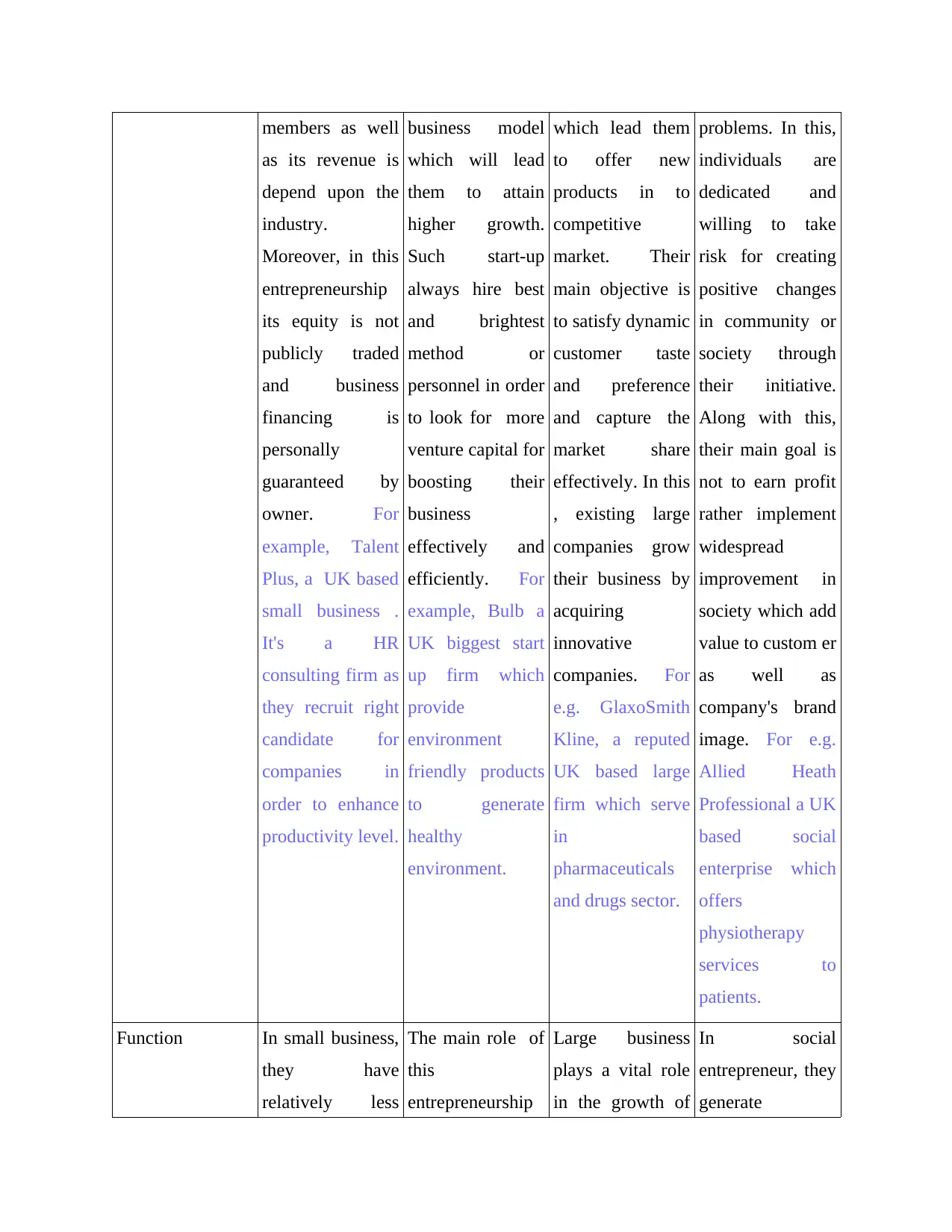
members as well
as its revenue is
depend upon the
industry.
Moreover, in this
entrepreneurship
its equity is not
publicly traded
and business
financing is
personally
guaranteed by
owner. For
example, Talent
Plus, a UK based
small business .
It's a HR
consulting firm as
they recruit right
candidate for
companies in
order to enhance
productivity level.
business model
which will lead
them to attain
higher growth.
Such start-up
always hire best
and brightest
method or
personnel in order
to look for more
venture capital for
boosting their
business
effectively and
efficiently. For
example, Bulb a
UK biggest start
up firm which
provide
environment
friendly products
to generate
healthy
environment.
which lead them
to offer new
products in to
competitive
market. Their
main objective is
to satisfy dynamic
customer taste
and preference
and capture the
market share
effectively. In this
, existing large
companies grow
their business by
acquiring
innovative
companies. For
e.g. GlaxoSmith
Kline, a reputed
UK based large
firm which serve
in
pharmaceuticals
and drugs sector.
problems. In this,
individuals are
dedicated and
willing to take
risk for creating
positive changes
in community or
society through
their initiative.
Along with this,
their main goal is
not to earn profit
rather implement
widespread
improvement in
society which add
value to custom er
as well as
company's brand
image. For e.g.
Allied Heath
Professional a UK
based social
enterprise which
offers
physiotherapy
services to
patients.
Function In small business,
they have
relatively less
The main role of
this
entrepreneurship
Large business
plays a vital role
in the growth of
In social
entrepreneur, they
generate
as its revenue is
depend upon the
industry.
Moreover, in this
entrepreneurship
its equity is not
publicly traded
and business
financing is
personally
guaranteed by
owner. For
example, Talent
Plus, a UK based
small business .
It's a HR
consulting firm as
they recruit right
candidate for
companies in
order to enhance
productivity level.
business model
which will lead
them to attain
higher growth.
Such start-up
always hire best
and brightest
method or
personnel in order
to look for more
venture capital for
boosting their
business
effectively and
efficiently. For
example, Bulb a
UK biggest start
up firm which
provide
environment
friendly products
to generate
healthy
environment.
which lead them
to offer new
products in to
competitive
market. Their
main objective is
to satisfy dynamic
customer taste
and preference
and capture the
market share
effectively. In this
, existing large
companies grow
their business by
acquiring
innovative
companies. For
e.g. GlaxoSmith
Kline, a reputed
UK based large
firm which serve
in
pharmaceuticals
and drugs sector.
problems. In this,
individuals are
dedicated and
willing to take
risk for creating
positive changes
in community or
society through
their initiative.
Along with this,
their main goal is
not to earn profit
rather implement
widespread
improvement in
society which add
value to custom er
as well as
company's brand
image. For e.g.
Allied Heath
Professional a UK
based social
enterprise which
offers
physiotherapy
services to
patients.
Function In small business,
they have
relatively less
The main role of
this
entrepreneurship
Large business
plays a vital role
in the growth of
In social
entrepreneur, they
generate
⊘ This is a preview!⊘
Do you want full access?
Subscribe today to unlock all pages.

Trusted by 1+ million students worldwide
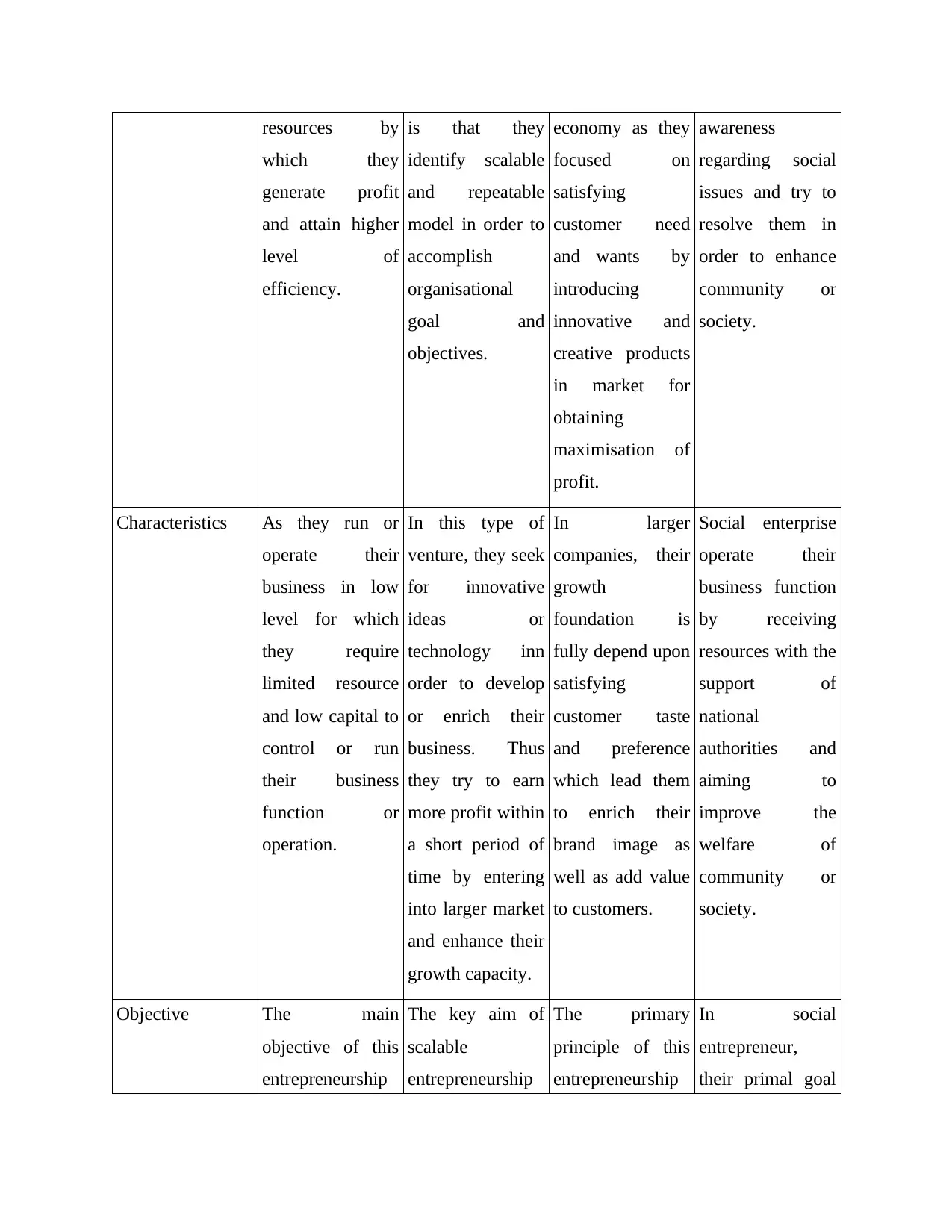
resources by
which they
generate profit
and attain higher
level of
efficiency.
is that they
identify scalable
and repeatable
model in order to
accomplish
organisational
goal and
objectives.
economy as they
focused on
satisfying
customer need
and wants by
introducing
innovative and
creative products
in market for
obtaining
maximisation of
profit.
awareness
regarding social
issues and try to
resolve them in
order to enhance
community or
society.
Characteristics As they run or
operate their
business in low
level for which
they require
limited resource
and low capital to
control or run
their business
function or
operation.
In this type of
venture, they seek
for innovative
ideas or
technology inn
order to develop
or enrich their
business. Thus
they try to earn
more profit within
a short period of
time by entering
into larger market
and enhance their
growth capacity.
In larger
companies, their
growth
foundation is
fully depend upon
satisfying
customer taste
and preference
which lead them
to enrich their
brand image as
well as add value
to customers.
Social enterprise
operate their
business function
by receiving
resources with the
support of
national
authorities and
aiming to
improve the
welfare of
community or
society.
Objective The main
objective of this
entrepreneurship
The key aim of
scalable
entrepreneurship
The primary
principle of this
entrepreneurship
In social
entrepreneur,
their primal goal
which they
generate profit
and attain higher
level of
efficiency.
is that they
identify scalable
and repeatable
model in order to
accomplish
organisational
goal and
objectives.
economy as they
focused on
satisfying
customer need
and wants by
introducing
innovative and
creative products
in market for
obtaining
maximisation of
profit.
awareness
regarding social
issues and try to
resolve them in
order to enhance
community or
society.
Characteristics As they run or
operate their
business in low
level for which
they require
limited resource
and low capital to
control or run
their business
function or
operation.
In this type of
venture, they seek
for innovative
ideas or
technology inn
order to develop
or enrich their
business. Thus
they try to earn
more profit within
a short period of
time by entering
into larger market
and enhance their
growth capacity.
In larger
companies, their
growth
foundation is
fully depend upon
satisfying
customer taste
and preference
which lead them
to enrich their
brand image as
well as add value
to customers.
Social enterprise
operate their
business function
by receiving
resources with the
support of
national
authorities and
aiming to
improve the
welfare of
community or
society.
Objective The main
objective of this
entrepreneurship
The key aim of
scalable
entrepreneurship
The primary
principle of this
entrepreneurship
In social
entrepreneur,
their primal goal
Paraphrase This Document
Need a fresh take? Get an instant paraphrase of this document with our AI Paraphraser
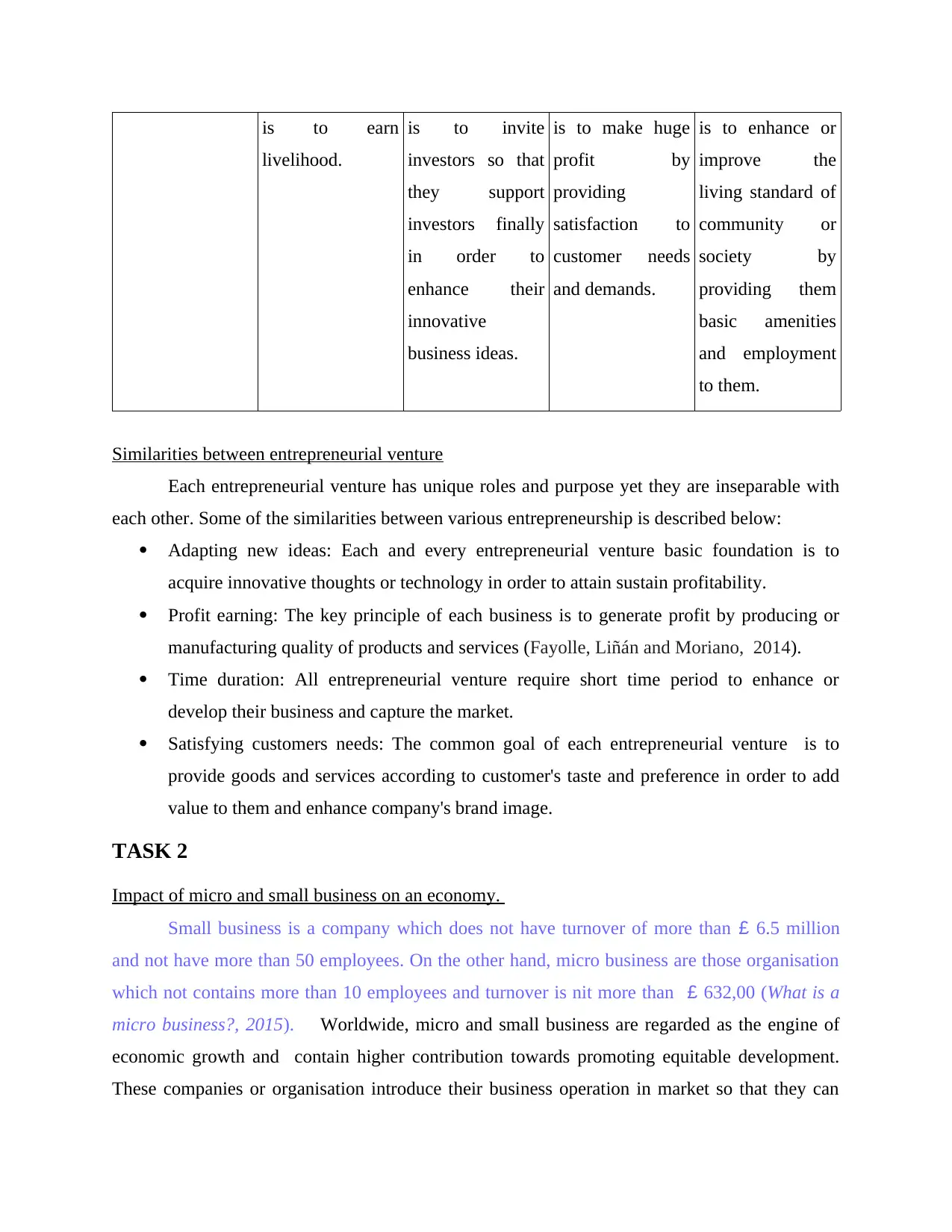
is to earn
livelihood.
is to invite
investors so that
they support
investors finally
in order to
enhance their
innovative
business ideas.
is to make huge
profit by
providing
satisfaction to
customer needs
and demands.
is to enhance or
improve the
living standard of
community or
society by
providing them
basic amenities
and employment
to them.
Similarities between entrepreneurial venture
Each entrepreneurial venture has unique roles and purpose yet they are inseparable with
each other. Some of the similarities between various entrepreneurship is described below:
Adapting new ideas: Each and every entrepreneurial venture basic foundation is to
acquire innovative thoughts or technology in order to attain sustain profitability.
Profit earning: The key principle of each business is to generate profit by producing or
manufacturing quality of products and services (Fayolle, Liñán and Moriano, 2014).
Time duration: All entrepreneurial venture require short time period to enhance or
develop their business and capture the market.
Satisfying customers needs: The common goal of each entrepreneurial venture is to
provide goods and services according to customer's taste and preference in order to add
value to them and enhance company's brand image.
TASK 2
Impact of micro and small business on an economy.
Small business is a company which does not have turnover of more than £ 6.5 million
and not have more than 50 employees. On the other hand, micro business are those organisation
which not contains more than 10 employees and turnover is nit more than £ 632,00 (What is a
micro business?, 2015). Worldwide, micro and small business are regarded as the engine of
economic growth and contain higher contribution towards promoting equitable development.
These companies or organisation introduce their business operation in market so that they can
livelihood.
is to invite
investors so that
they support
investors finally
in order to
enhance their
innovative
business ideas.
is to make huge
profit by
providing
satisfaction to
customer needs
and demands.
is to enhance or
improve the
living standard of
community or
society by
providing them
basic amenities
and employment
to them.
Similarities between entrepreneurial venture
Each entrepreneurial venture has unique roles and purpose yet they are inseparable with
each other. Some of the similarities between various entrepreneurship is described below:
Adapting new ideas: Each and every entrepreneurial venture basic foundation is to
acquire innovative thoughts or technology in order to attain sustain profitability.
Profit earning: The key principle of each business is to generate profit by producing or
manufacturing quality of products and services (Fayolle, Liñán and Moriano, 2014).
Time duration: All entrepreneurial venture require short time period to enhance or
develop their business and capture the market.
Satisfying customers needs: The common goal of each entrepreneurial venture is to
provide goods and services according to customer's taste and preference in order to add
value to them and enhance company's brand image.
TASK 2
Impact of micro and small business on an economy.
Small business is a company which does not have turnover of more than £ 6.5 million
and not have more than 50 employees. On the other hand, micro business are those organisation
which not contains more than 10 employees and turnover is nit more than £ 632,00 (What is a
micro business?, 2015). Worldwide, micro and small business are regarded as the engine of
economic growth and contain higher contribution towards promoting equitable development.
These companies or organisation introduce their business operation in market so that they can
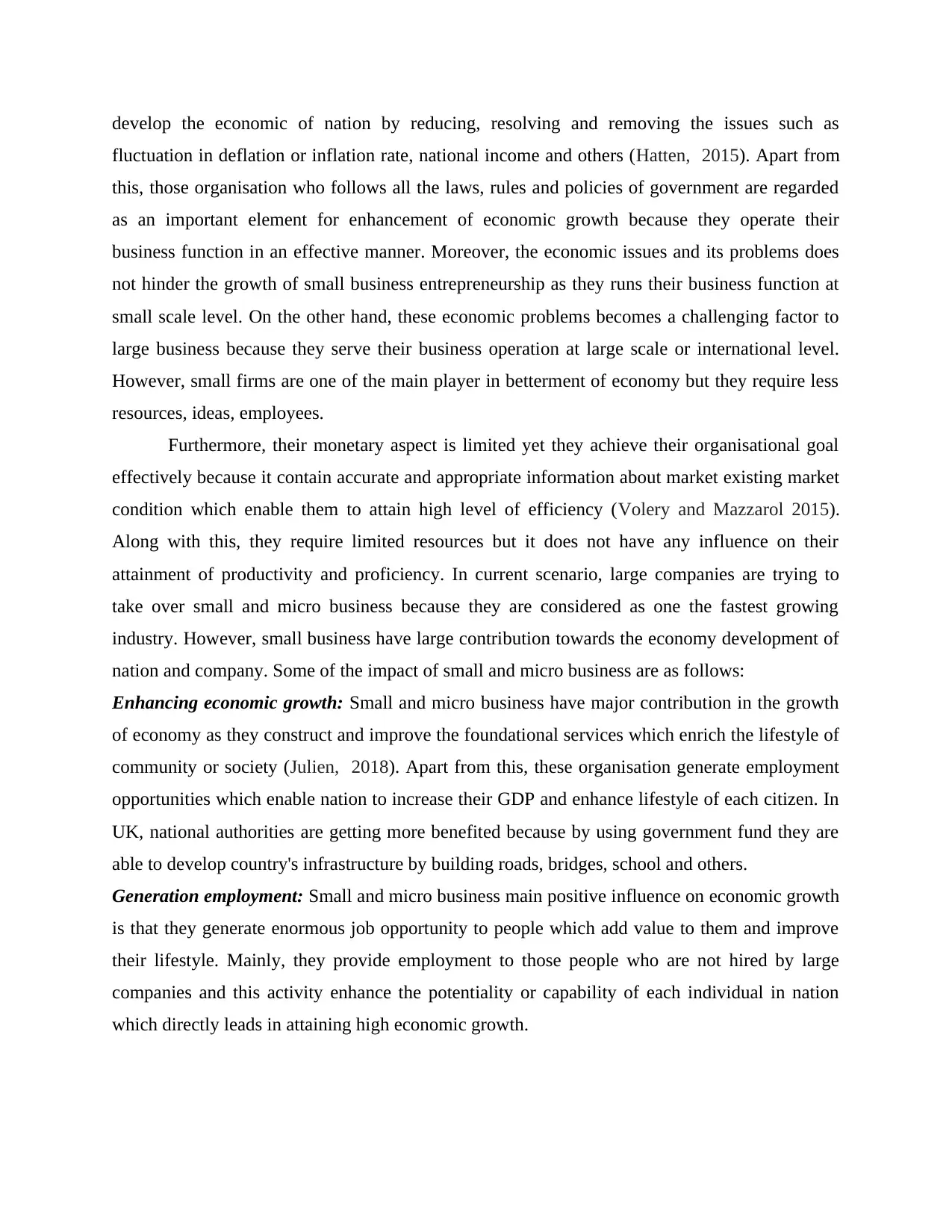
develop the economic of nation by reducing, resolving and removing the issues such as
fluctuation in deflation or inflation rate, national income and others (Hatten, 2015). Apart from
this, those organisation who follows all the laws, rules and policies of government are regarded
as an important element for enhancement of economic growth because they operate their
business function in an effective manner. Moreover, the economic issues and its problems does
not hinder the growth of small business entrepreneurship as they runs their business function at
small scale level. On the other hand, these economic problems becomes a challenging factor to
large business because they serve their business operation at large scale or international level.
However, small firms are one of the main player in betterment of economy but they require less
resources, ideas, employees.
Furthermore, their monetary aspect is limited yet they achieve their organisational goal
effectively because it contain accurate and appropriate information about market existing market
condition which enable them to attain high level of efficiency (Volery and Mazzarol 2015).
Along with this, they require limited resources but it does not have any influence on their
attainment of productivity and proficiency. In current scenario, large companies are trying to
take over small and micro business because they are considered as one the fastest growing
industry. However, small business have large contribution towards the economy development of
nation and company. Some of the impact of small and micro business are as follows:
Enhancing economic growth: Small and micro business have major contribution in the growth
of economy as they construct and improve the foundational services which enrich the lifestyle of
community or society (Julien, 2018). Apart from this, these organisation generate employment
opportunities which enable nation to increase their GDP and enhance lifestyle of each citizen. In
UK, national authorities are getting more benefited because by using government fund they are
able to develop country's infrastructure by building roads, bridges, school and others.
Generation employment: Small and micro business main positive influence on economic growth
is that they generate enormous job opportunity to people which add value to them and improve
their lifestyle. Mainly, they provide employment to those people who are not hired by large
companies and this activity enhance the potentiality or capability of each individual in nation
which directly leads in attaining high economic growth.
fluctuation in deflation or inflation rate, national income and others (Hatten, 2015). Apart from
this, those organisation who follows all the laws, rules and policies of government are regarded
as an important element for enhancement of economic growth because they operate their
business function in an effective manner. Moreover, the economic issues and its problems does
not hinder the growth of small business entrepreneurship as they runs their business function at
small scale level. On the other hand, these economic problems becomes a challenging factor to
large business because they serve their business operation at large scale or international level.
However, small firms are one of the main player in betterment of economy but they require less
resources, ideas, employees.
Furthermore, their monetary aspect is limited yet they achieve their organisational goal
effectively because it contain accurate and appropriate information about market existing market
condition which enable them to attain high level of efficiency (Volery and Mazzarol 2015).
Along with this, they require limited resources but it does not have any influence on their
attainment of productivity and proficiency. In current scenario, large companies are trying to
take over small and micro business because they are considered as one the fastest growing
industry. However, small business have large contribution towards the economy development of
nation and company. Some of the impact of small and micro business are as follows:
Enhancing economic growth: Small and micro business have major contribution in the growth
of economy as they construct and improve the foundational services which enrich the lifestyle of
community or society (Julien, 2018). Apart from this, these organisation generate employment
opportunities which enable nation to increase their GDP and enhance lifestyle of each citizen. In
UK, national authorities are getting more benefited because by using government fund they are
able to develop country's infrastructure by building roads, bridges, school and others.
Generation employment: Small and micro business main positive influence on economic growth
is that they generate enormous job opportunity to people which add value to them and improve
their lifestyle. Mainly, they provide employment to those people who are not hired by large
companies and this activity enhance the potentiality or capability of each individual in nation
which directly leads in attaining high economic growth.
⊘ This is a preview!⊘
Do you want full access?
Subscribe today to unlock all pages.

Trusted by 1+ million students worldwide
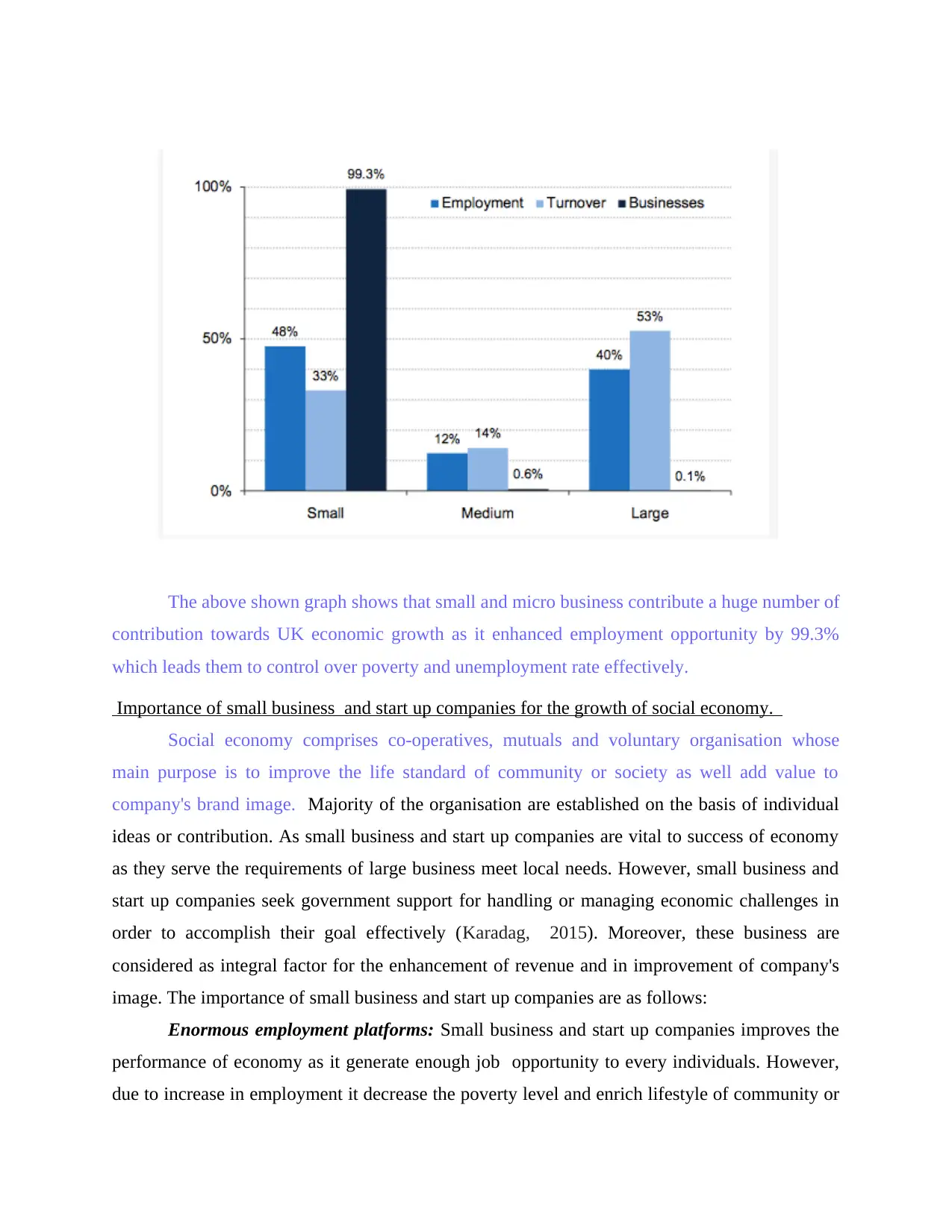
The above shown graph shows that small and micro business contribute a huge number of
contribution towards UK economic growth as it enhanced employment opportunity by 99.3%
which leads them to control over poverty and unemployment rate effectively.
Importance of small business and start up companies for the growth of social economy.
Social economy comprises co-operatives, mutuals and voluntary organisation whose
main purpose is to improve the life standard of community or society as well add value to
company's brand image. Majority of the organisation are established on the basis of individual
ideas or contribution. As small business and start up companies are vital to success of economy
as they serve the requirements of large business meet local needs. However, small business and
start up companies seek government support for handling or managing economic challenges in
order to accomplish their goal effectively (Karadag, 2015). Moreover, these business are
considered as integral factor for the enhancement of revenue and in improvement of company's
image. The importance of small business and start up companies are as follows:
Enormous employment platforms: Small business and start up companies improves the
performance of economy as it generate enough job opportunity to every individuals. However,
due to increase in employment it decrease the poverty level and enrich lifestyle of community or
contribution towards UK economic growth as it enhanced employment opportunity by 99.3%
which leads them to control over poverty and unemployment rate effectively.
Importance of small business and start up companies for the growth of social economy.
Social economy comprises co-operatives, mutuals and voluntary organisation whose
main purpose is to improve the life standard of community or society as well add value to
company's brand image. Majority of the organisation are established on the basis of individual
ideas or contribution. As small business and start up companies are vital to success of economy
as they serve the requirements of large business meet local needs. However, small business and
start up companies seek government support for handling or managing economic challenges in
order to accomplish their goal effectively (Karadag, 2015). Moreover, these business are
considered as integral factor for the enhancement of revenue and in improvement of company's
image. The importance of small business and start up companies are as follows:
Enormous employment platforms: Small business and start up companies improves the
performance of economy as it generate enough job opportunity to every individuals. However,
due to increase in employment it decrease the poverty level and enrich lifestyle of community or
Paraphrase This Document
Need a fresh take? Get an instant paraphrase of this document with our AI Paraphraser
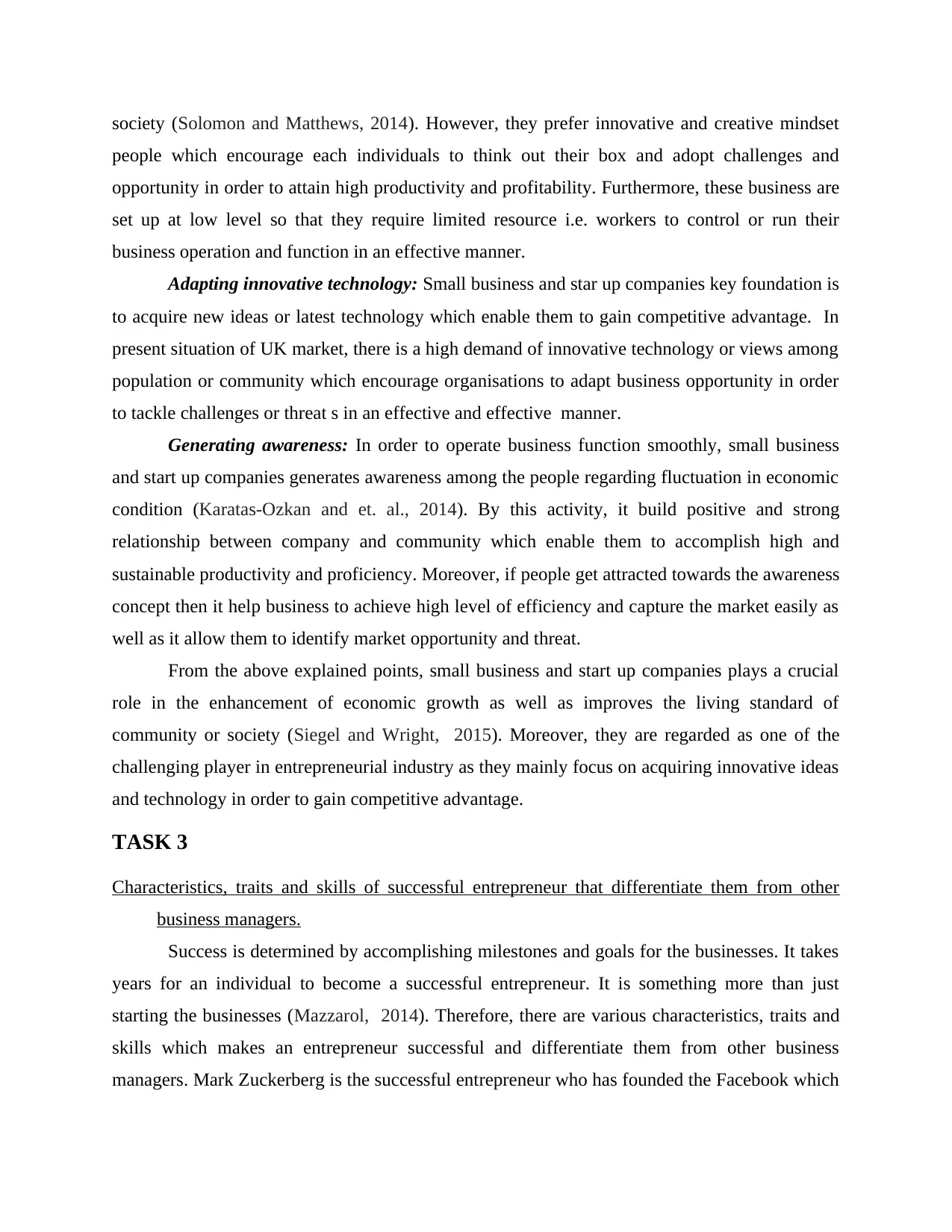
society (Solomon and Matthews, 2014). However, they prefer innovative and creative mindset
people which encourage each individuals to think out their box and adopt challenges and
opportunity in order to attain high productivity and profitability. Furthermore, these business are
set up at low level so that they require limited resource i.e. workers to control or run their
business operation and function in an effective manner.
Adapting innovative technology: Small business and star up companies key foundation is
to acquire new ideas or latest technology which enable them to gain competitive advantage. In
present situation of UK market, there is a high demand of innovative technology or views among
population or community which encourage organisations to adapt business opportunity in order
to tackle challenges or threat s in an effective and effective manner.
Generating awareness: In order to operate business function smoothly, small business
and start up companies generates awareness among the people regarding fluctuation in economic
condition (Karatas‐Ozkan and et. al., 2014). By this activity, it build positive and strong
relationship between company and community which enable them to accomplish high and
sustainable productivity and proficiency. Moreover, if people get attracted towards the awareness
concept then it help business to achieve high level of efficiency and capture the market easily as
well as it allow them to identify market opportunity and threat.
From the above explained points, small business and start up companies plays a crucial
role in the enhancement of economic growth as well as improves the living standard of
community or society (Siegel and Wright, 2015). Moreover, they are regarded as one of the
challenging player in entrepreneurial industry as they mainly focus on acquiring innovative ideas
and technology in order to gain competitive advantage.
TASK 3
Characteristics, traits and skills of successful entrepreneur that differentiate them from other
business managers.
Success is determined by accomplishing milestones and goals for the businesses. It takes
years for an individual to become a successful entrepreneur. It is something more than just
starting the businesses (Mazzarol, 2014). Therefore, there are various characteristics, traits and
skills which makes an entrepreneur successful and differentiate them from other business
managers. Mark Zuckerberg is the successful entrepreneur who has founded the Facebook which
people which encourage each individuals to think out their box and adopt challenges and
opportunity in order to attain high productivity and profitability. Furthermore, these business are
set up at low level so that they require limited resource i.e. workers to control or run their
business operation and function in an effective manner.
Adapting innovative technology: Small business and star up companies key foundation is
to acquire new ideas or latest technology which enable them to gain competitive advantage. In
present situation of UK market, there is a high demand of innovative technology or views among
population or community which encourage organisations to adapt business opportunity in order
to tackle challenges or threat s in an effective and effective manner.
Generating awareness: In order to operate business function smoothly, small business
and start up companies generates awareness among the people regarding fluctuation in economic
condition (Karatas‐Ozkan and et. al., 2014). By this activity, it build positive and strong
relationship between company and community which enable them to accomplish high and
sustainable productivity and proficiency. Moreover, if people get attracted towards the awareness
concept then it help business to achieve high level of efficiency and capture the market easily as
well as it allow them to identify market opportunity and threat.
From the above explained points, small business and start up companies plays a crucial
role in the enhancement of economic growth as well as improves the living standard of
community or society (Siegel and Wright, 2015). Moreover, they are regarded as one of the
challenging player in entrepreneurial industry as they mainly focus on acquiring innovative ideas
and technology in order to gain competitive advantage.
TASK 3
Characteristics, traits and skills of successful entrepreneur that differentiate them from other
business managers.
Success is determined by accomplishing milestones and goals for the businesses. It takes
years for an individual to become a successful entrepreneur. It is something more than just
starting the businesses (Mazzarol, 2014). Therefore, there are various characteristics, traits and
skills which makes an entrepreneur successful and differentiate them from other business
managers. Mark Zuckerberg is the successful entrepreneur who has founded the Facebook which
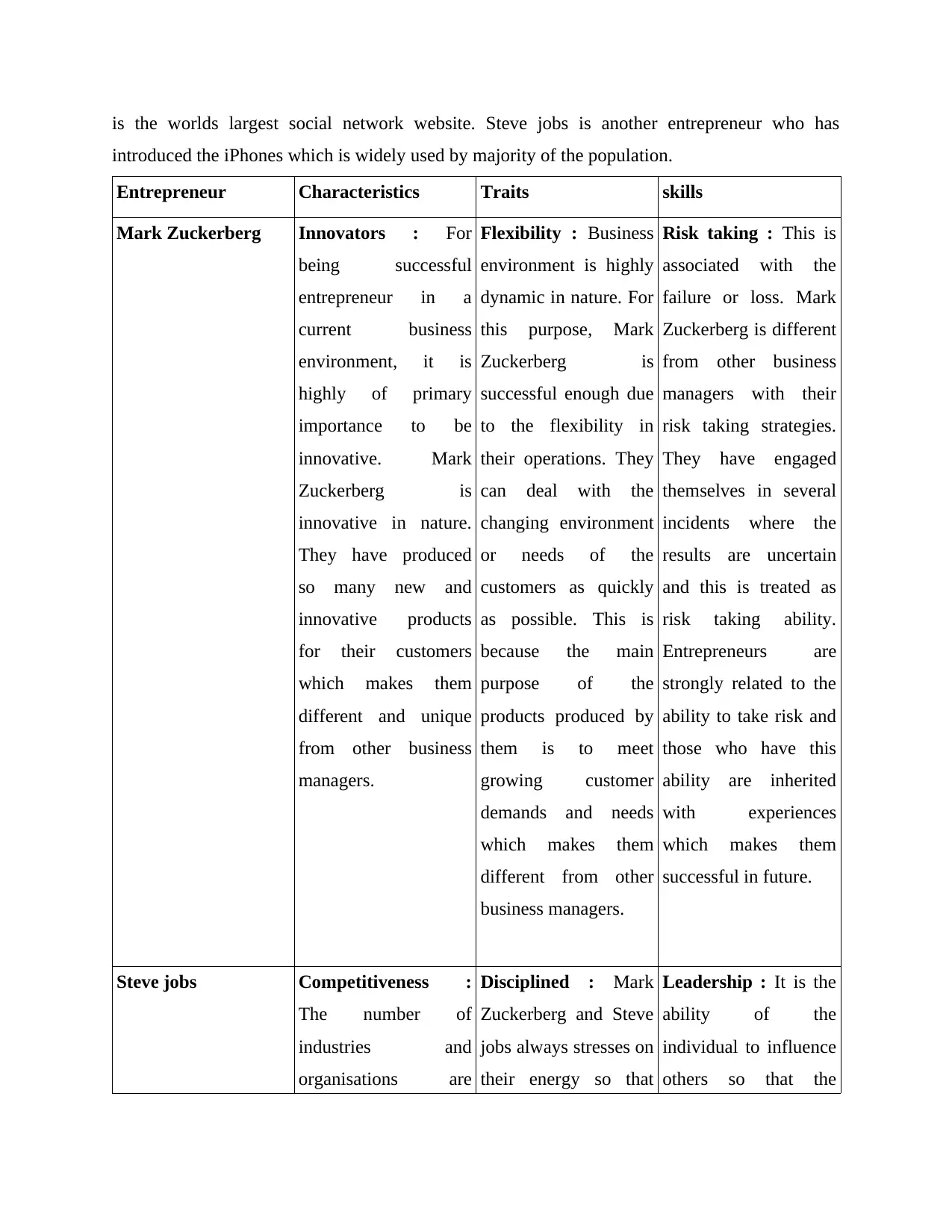
is the worlds largest social network website. Steve jobs is another entrepreneur who has
introduced the iPhones which is widely used by majority of the population.
Entrepreneur Characteristics Traits skills
Mark Zuckerberg Innovators : For
being successful
entrepreneur in a
current business
environment, it is
highly of primary
importance to be
innovative. Mark
Zuckerberg is
innovative in nature.
They have produced
so many new and
innovative products
for their customers
which makes them
different and unique
from other business
managers.
Flexibility : Business
environment is highly
dynamic in nature. For
this purpose, Mark
Zuckerberg is
successful enough due
to the flexibility in
their operations. They
can deal with the
changing environment
or needs of the
customers as quickly
as possible. This is
because the main
purpose of the
products produced by
them is to meet
growing customer
demands and needs
which makes them
different from other
business managers.
Risk taking : This is
associated with the
failure or loss. Mark
Zuckerberg is different
from other business
managers with their
risk taking strategies.
They have engaged
themselves in several
incidents where the
results are uncertain
and this is treated as
risk taking ability.
Entrepreneurs are
strongly related to the
ability to take risk and
those who have this
ability are inherited
with experiences
which makes them
successful in future.
Steve jobs Competitiveness :
The number of
industries and
organisations are
Disciplined : Mark
Zuckerberg and Steve
jobs always stresses on
their energy so that
Leadership : It is the
ability of the
individual to influence
others so that the
introduced the iPhones which is widely used by majority of the population.
Entrepreneur Characteristics Traits skills
Mark Zuckerberg Innovators : For
being successful
entrepreneur in a
current business
environment, it is
highly of primary
importance to be
innovative. Mark
Zuckerberg is
innovative in nature.
They have produced
so many new and
innovative products
for their customers
which makes them
different and unique
from other business
managers.
Flexibility : Business
environment is highly
dynamic in nature. For
this purpose, Mark
Zuckerberg is
successful enough due
to the flexibility in
their operations. They
can deal with the
changing environment
or needs of the
customers as quickly
as possible. This is
because the main
purpose of the
products produced by
them is to meet
growing customer
demands and needs
which makes them
different from other
business managers.
Risk taking : This is
associated with the
failure or loss. Mark
Zuckerberg is different
from other business
managers with their
risk taking strategies.
They have engaged
themselves in several
incidents where the
results are uncertain
and this is treated as
risk taking ability.
Entrepreneurs are
strongly related to the
ability to take risk and
those who have this
ability are inherited
with experiences
which makes them
successful in future.
Steve jobs Competitiveness :
The number of
industries and
organisations are
Disciplined : Mark
Zuckerberg and Steve
jobs always stresses on
their energy so that
Leadership : It is the
ability of the
individual to influence
others so that the
⊘ This is a preview!⊘
Do you want full access?
Subscribe today to unlock all pages.

Trusted by 1+ million students worldwide
1 out of 17
Related Documents
Your All-in-One AI-Powered Toolkit for Academic Success.
+13062052269
info@desklib.com
Available 24*7 on WhatsApp / Email
![[object Object]](/_next/static/media/star-bottom.7253800d.svg)
Unlock your academic potential
Copyright © 2020–2026 A2Z Services. All Rights Reserved. Developed and managed by ZUCOL.





